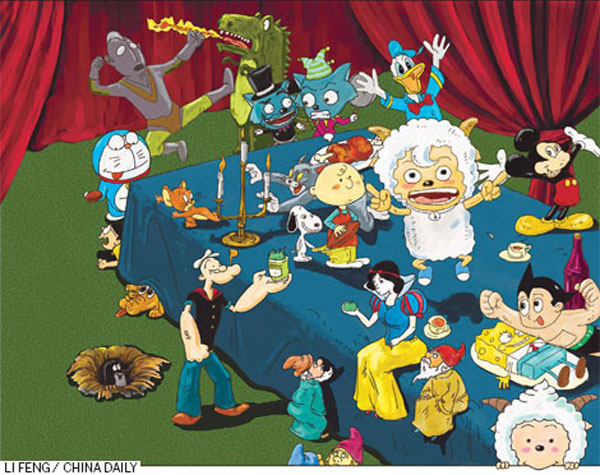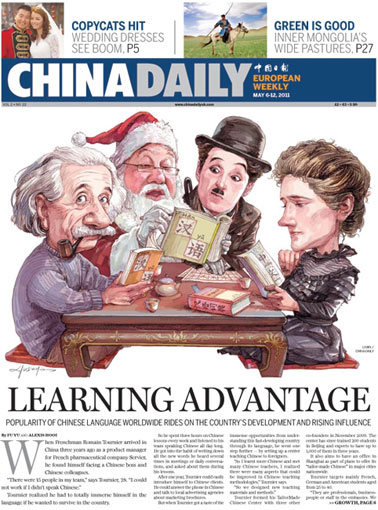Have you any wool?
Updated: 2011-04-01 11:06
By Wang Wei (China Daily European Weekly)

When a flock of sheep cry 'wolf' in China, the money rolls in. the new stars of Chinese animation are edging out old childhood icons like Mickey Mouse and Hello Kitty
English children grow up with Winnie the Pooh, while in Europe, there are Asterix, Tintin and Diddl Mouse to keep the little ones amused. Another rodent family, Mickey Mouse and friends, has long dominated the American animation world, and the Japanese managed to build an entire empire out of a lipless feline named Hello Kitty. Even Hong Kong has a lovable piglet called McDull that takes trips up the Peak tram.
On the Chinese mainland, it has taken until relatively recently for a few sheep and a big gray wolf to come into their own as characters that Chinese children can totally identify with, and that have the commercial potential and success cartoon characters overseas have long enjoyed.
These furry creatures, Pleasant Goat and Big Big Wolf, are hogging the box office and racking in countless millions in film rights merchandising. (Right, they are sheep, but there is no difference between "sheep" and "goat" in the Chinese language.)
There is nowhere you can go in China without bumping into these characters - from the most remote village to the most populated cities.
Hole-in-the-wall shops in one-street villages strategically place the sheep kiddie-rides just outside the door. In shopping centers in Beijing, Shanghai and Guangzhou, specialty shops selling pens, pencils, erasers and other accoutrements of scholarship spot their cute, fluffy countenances.
Pleasant Goat and Big Big Wolf was mooted by Creative Power Entertaining (CPE), an animation team based in Guangdong province. It prefers to dedicate its resources to the production of the television and film facets of the series and outsources the merchandising franchise to about 300 different companies that use the characters on more than a thousand products ranging from clothes to food to toys.
In the line-up before the Spring or Mid-Autumn Festivals, for example, the shopping frenzy incited by festive goodwill sees doting parents buy children's clothes emblazoned with big-eyed sheep faces, which are also stamped on mittens, caps, hat, socks and the traditional lanterns.
This is already an unofficial billion-dollar industry without counting the television revenue and the box-office takings.
When it comes to airtime, Pleasant Goat and Big Big Wolf is currently shown over more than 70 television channels worldwide, and the big-screen appearances have knocked even imported animation features off their perches at the cinemas.
Soon these pastoral characters will travel even further afield. CPE has already reached an agreement with Buena Vista Worldwide Home Entertainment, the Walt Disney distribution arm outside America. Buena Vista will distribute the latest 100 episodes of the cartoon series in 10 languages to 52 countries and regions in the Asia-Pacific circuit through the Walt Disney Channel on cable. This deal will cement the popularity of Pleasant Goat far beyond China.
On the big screen, these characters are also raking in the big bucks. The latest and third film sequel which premiered on Jan 21 in cinemas scored 130 million yuan (14 million euros) in takings, edging past the second sequel which had already broken box office records for animated films with 128 million yuan in total tickets.
It all started with a cartoon series designed for TV. Pleasant Goat and Big Big Wolf debuted in 2005, and in the years since, the series has chalked up 600 episodes, hitting consistently high viewership ratings in Beijing, Shanghai and Guangzhou.
The storylines are simple and chronicle the attempts of a henpecked wolf who tries every possible means to catch a flock of sheep, all with lovable names and characteristics. Leader of the flock is Xi Yangyang, the Pleasant Goat of the title. His name is homophonic for "joy", and his friends include Lan Yangyang, the lazy glutton and Mei Yangyang, the pretty and elegant ewe.
The success of Pleasant Goat and Big Big Wolf marks the efforts that China has invested in the revival and rejuvenation of its animation industry.
According to guidelines issued in 2006 by the State Council, China intends to establish a world-class animation industry within five to 10 years.
The vice-minister in the Ministry of Culture, Ouyang Jian, says that the production of animated series has increased from 80,000 minutes per year in 2000 to 220,000 minutes in 2010. Twenty-four companies had realized an annual output valued at 30 million yuan by the end of 2009.
It is a productivity and popularity helped by supportive policies.
To promote locally-made animation, the State Administration of Radio, Film and Television stipulated that from Sept 1, 2006, all television channels across China were to telecast only made-in-China animation features during the prime-time period from 5 pm to 8 pm. Dedicated children's channels were to show domestically-produced cartoons, according to the policy.
This "close-shop" policy gave domestic animators the platform they needed, but the industry had to find its own levels and catch up with demand.
Even at the big screen box office, not all locally-made feature films enjoyed the same rate of success. As of August 2010, eight domestic animation pictures had hit the cinemas within the year, with total takings of 164 million yuan. Four-fifths of that revenue came from Pleasant Goat and Big Big Wolf, according to the New Culture Industry Club, an industry observer with members drawn from investment companies, animation clubs, media companies and business schools. Most of the other seven did not even recover their investments.
One huge success may not reflect the state of health of an entire industry, and Chinese animation has a long way to go to compete on equal footing with imported cartoon icons.
In a free-market situation, the target audience is an exacting and critical one which is notoriously hard to please. Children tend to speak their minds with fearful honesty.
Ma Chuan, father of a 3-year-old boy, told China Daily his son's favorite cartoons are the US-produced Dora the Explorer, and In the Night Garden created by the British Broadcasting Corporation (BBC).
He bought a dozen Dora The Explorer DVDs for his child.
"Sometimes I switch channels to a locally-made animated series for my son, but he loses interest in four to five minutes," he says.
"Dora The Explorer is in English, and I bet my son doesn't understand many words there, but he can sit for hours watching the series. I think it is more the story and colorful images which make a difference," Ma says.
"People think the lack of the latest technology is the primary reason why China's animation industry is lagging behind," says Zheng Hu, vice-president of the Shanghai Animation Film Studio. "But in fact, we are already equipped with advanced technology, and many Hollywood film studios outsource post-production work to Chinese companies."
Zheng believes that what China lacks is the ability to tell stories with humor, pace and good timing. The current approach is too rigid and "preachy". Also there is a shortage of people who can brand and market a cartoon successfully.
"Kungfu Panda had a team of a dozen people to research and evaluate the value of the movie, but we don't have the talent or the mechanism," he says.
As experts in the mainland are so fond of saying in recent years, we just need the software to catch up with the hardware.
E-paper

War of the roses
European Chinese rose growers are beating their Chinese rivals at their own game
High-tech park gets big boost
At the source
Merchant of Venice
Specials

Sino-US Dialogue
China and the US hold the third round of the Strategic and Economic Dialogue on May 9-10 in Washington.

Drunk driving
Drunk drivers face a detention for one to six months and a revokation of their drivers' license.

V-Day parade
A military parade marking the 66th anniversary of the Soviet victory over Nazi.
